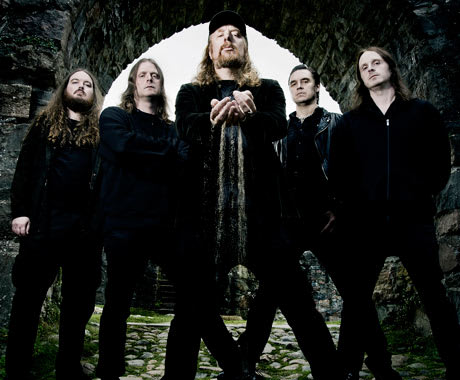At War With Reality is kind of an autobiographical title for Gothenburg death metal legends At the Gates. The reality: nearly two decades ago, they broke up just ten months after the release of their now-classic 1995 LP Slaughter of the Soul. The war? Despite live reunions in 2008, 2010 and beyond, the band had stated that new material from the quintessential melodic death metal band was out of the question.
Fortunately, "never" lost out in this battle. According to vocalist Tomas Lindberg, going back on previous declarations was actually the only way for the band to remain honest: a value that's very important to them.
"It would be dishonest to everybody if we just held back because of a statement, because words are just words that are uttered in one period of your life, in one context. … Times change people."
That change prompted guitarist Anders Björler to begin writing new At the Gates material in the summer of 2013. Although the album title is a remnant of the '90s — an idea guitarist Martin Larsson had come up with back then — everything else is newly penned.
Musically, mournful melodies set the mood, which is something Lindberg says was more evident on the band's earlier material, such as 1993's With Fear I Kiss the Burning Darkness and 1994's Terminal Spirit Disease. "We actually wanted a little bit to incorporate more of the earlier melancholy. To mix melancholy with desperation can — if you really get an honest approach to it and if you really make it from the heart — be very touching, in a way. It can really reach out to the listener, I think. With the melancholy mixed with desperation it's kind of like frustrated anger instead of just pissed off anger."
It wasn't just their past that inspired At War With Reality, though. For lyrics, Lindberg's love of literature came into play, as he based the concept around magic realism, the post-colonial South American literary style.
With a strong hold in the real world, magic realism adds in doses of "heightened reality," making the listener question what's true. When the consumer applies their own worldview to the story, they create a new version of it. As Lindberg suggests, "The text is always alive and ever-changing."
"It's kind of an extra gift to the listener if they want it. It could be understood very easily; if you want to listen to the record and just feel it and be moved by it, on one level the lyrics work just like that. But then you could, on a different level, go into the concept and really explore further.
"There are some new, weird aspects as well, arrangement-wise, on this record," he continues, "stuff that we might want to pursue later, you know?" Perhaps we now live in a reality where even more At the Gates material is a possibility? Or maybe that's reading into it too deeply. Only they know.
Fortunately, "never" lost out in this battle. According to vocalist Tomas Lindberg, going back on previous declarations was actually the only way for the band to remain honest: a value that's very important to them.
"It would be dishonest to everybody if we just held back because of a statement, because words are just words that are uttered in one period of your life, in one context. … Times change people."
That change prompted guitarist Anders Björler to begin writing new At the Gates material in the summer of 2013. Although the album title is a remnant of the '90s — an idea guitarist Martin Larsson had come up with back then — everything else is newly penned.
Musically, mournful melodies set the mood, which is something Lindberg says was more evident on the band's earlier material, such as 1993's With Fear I Kiss the Burning Darkness and 1994's Terminal Spirit Disease. "We actually wanted a little bit to incorporate more of the earlier melancholy. To mix melancholy with desperation can — if you really get an honest approach to it and if you really make it from the heart — be very touching, in a way. It can really reach out to the listener, I think. With the melancholy mixed with desperation it's kind of like frustrated anger instead of just pissed off anger."
It wasn't just their past that inspired At War With Reality, though. For lyrics, Lindberg's love of literature came into play, as he based the concept around magic realism, the post-colonial South American literary style.
With a strong hold in the real world, magic realism adds in doses of "heightened reality," making the listener question what's true. When the consumer applies their own worldview to the story, they create a new version of it. As Lindberg suggests, "The text is always alive and ever-changing."
"It's kind of an extra gift to the listener if they want it. It could be understood very easily; if you want to listen to the record and just feel it and be moved by it, on one level the lyrics work just like that. But then you could, on a different level, go into the concept and really explore further.
"There are some new, weird aspects as well, arrangement-wise, on this record," he continues, "stuff that we might want to pursue later, you know?" Perhaps we now live in a reality where even more At the Gates material is a possibility? Or maybe that's reading into it too deeply. Only they know.
